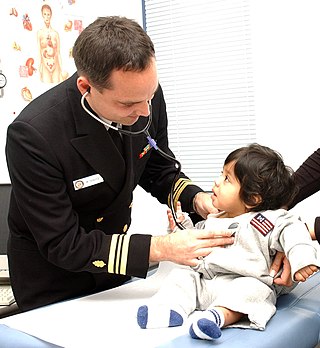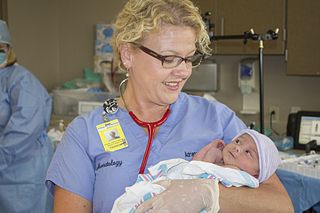Related Research Articles

A registered nurse (RN) is a nurse who has graduated or successfully passed a nursing program from a recognized nursing school and met the requirements outlined by a country, state, province or similar government-authorized licensing body to obtain a nursing license. An RN's scope of practice is determined by legislation, and is regulated by a professional body or council.

A nurse practitioner (NP) is an advanced practice registered nurse and a type of mid-level practitioner. NPs are trained to assess patient needs, order and interpret diagnostic and laboratory tests, diagnose disease, formulate and prescribe medications and treatment plans. NP training covers basic disease prevention, coordination of care, and health promotion. One study found that although reasons for referrals to specialists are similar for both physicians and NPs, the quality of documentation in the referrals may be lower for NPs.
An advanced practice nurse (APN) is a nurse with post-graduate education and training in nursing. Nurses practicing at this level may work in either a specialist or generalist capacity. APNs are prepared with advanced didactic and clinical education, knowledge, skills, and scope of practice in nursing.
Nursing credentials and certifications are the various credentials and certifications that a person must have to practice nursing legally. Nurses' postnominal letters reflect their credentials—that is, their achievements in nursing education, licensure, certification, and fellowship. The letters usually appear in the following order:
A clinical nurse specialist (CNS) is an advanced practice nurse who can provide advice related to specific conditions or treatment pathways. According to the International Council of Nurses (ICN), an Advanced Practice Nurse is a registered nurse who has acquired the expert knowledge base, complex decision-making skills and clinical competencies for expanded practice, the characteristics of which are shaped by the context and/or country in which s/he is credentialed to practice.

Nurses in the United States practice nursing in a wide variety of specialties and departments.

Gerontological nursing is the specialty of nursing pertaining to older adults. Gerontological nurses work in collaboration with older adults, their families, and communities to support healthy aging, maximum functioning, and quality of life. The term gerontological nursing, which replaced the term geriatric nursing in the 1970s, is seen as being more consistent with the specialty's broader focus on health and wellness, in addition to illness.
The American Nurses Credentialing Center (ANCC), a subsidiary of the American Nurses Association (ANA), is a certification body for nursing board certification and the largest certification body for advanced practice registered nurses in the United States, as of 2011 certifying over 75,000 APRNs, including nurse practitioners and clinical nurse specialists.

A family nurse practitioner (FNP) provides continuing and comprehensive healthcare for the individual and family across all ages, genders, diseases, and body systems. Primary care emphasizes the holistic nature of health and it is based on knowledge of the patient in the context of the family and the community, emphasizing disease prevention and health promotion.

Nursing is a profession within the healthcare sector focused on the care of individuals, families, and communities so they may attain, maintain, or recover optimal health and quality of life. Nurses can be differentiated from other healthcare providers by their approach to patient care, training, and scope of practice. Nurses practice in many specialties with differing levels of prescription authority. Nurses comprise the largest component of most healthcare environments; but there is evidence of international shortages of qualified nurses. Nurses collaborate with other healthcare providers such as physicians, nurse practitioners, physical therapists, and psychologists. There is a distinction between nurses and nurse practitioners; in the U.S., the latter are nurses with a graduate degree in advanced practice nursing, and are permitted to prescribe medications unlike the former. They practice independently in a variety of settings in more than half of the United States. Since the postwar period, nurse education has undergone a process of diversification towards advanced and specialized credentials, and many of the traditional regulations and provider roles are changing.
Nursing in Japan did not develop as an occupation until the end of the nineteenth century. Initially introduced only in Tokyo in the late 1860s, small schools utilizing Western models were being opened by the late 1880s. In response to disaster relief, the Japanese Red Cross became an integral part of nursing development. By 1915, nurse registration had been established and public health nurses began working throughout the country. Nursing universities were established in the twentieth century and regulations were passed to develop standards for training and public health.
Public health nursing, also known as community health nursing is a nursing specialty focused on public health. The term was coined by Lillian Wald of the Henry Street Settlement, or, Public health nurses (PHNs) or community health nurses "integrate community involvement and knowledge about the entire population with personal, clinical understandings of the health and illness experiences of individuals and families within the population." Public health nursing in the United States traces back to a nurse named Lillian Wald who, in 1893, established the Henry Street Settlement in New York City and coined the expression "public health nurse". A Public or Community Health Nurse is expected to comply with the duties and limitations of the American Nurse Association (ANA) publication Public Health Nursing: Scope and Standards of Practice.
Genetics nursing is a nursing specialty that focuses on providing genetic healthcare to patients.

A neonatal nurse practitioner (NNP) is an advanced practice registered nurse (APRN) with at least 2 years experience as a bedside registered nurse in a Level III NICU, who is prepared to practice across the continuum, providing primary, acute, chronic, and critical care to neonates, infants, and toddlers through age 2. Primarily working in neonatal intensive care unit (NICU) settings, NNPs select and perform clinically indicated advanced diagnostic and therapeutic invasive procedures. In the United States, a board certified neonatal nurse practitioner (NNP-BC) is an APRN who has acquired Graduate education at the master's or doctoral level and has a board certification in neonatology. The National Association of Neonatal Nurse Practitioners (NANNP) is the national association that represents neonatal nurse practitioners in the United States. Certification is governed by the National Certification Corporation for Obstetrics, Gynecologic and Neonatal Nursing Specialties (NCC).
An adult-gerontology nurse practitioner (AGNP) is a nurse practitioner that specializes in continuing and comprehensive healthcare for adults across the lifespan from adolescence to old age.
Midwives in the United States assist childbearing women during pregnancy, labor and birth, and the postpartum period. Some midwives also provide primary care for women including well-woman exams, health promotion, and disease prevention, family planning options, and care for common gynecological concerns. Before the turn of the 20th century, traditional midwives were informally trained and helped deliver almost all births. Today, midwives are professionals who must undergo formal training. Midwives in the United States formed the Midwifery Education, Regulation, and Association task force to establish a framework for midwifery.
Advanced practice registered nurses (APRNs) are registered nurses with graduate degrees in nursing. APRN roles include: certified nurse midwife, clinical nurse specialist, certified registered nurse anesthetist, and nurse practitioner. APRNs assess, diagnose, manage patient medical problems, order diagnostic tests, and prescribe medications. Rules, regulations, and credentialing for APRNs vary by state. This page outlines the regulatory processes for nurse practitioners in Wisconsin, including education, certification, licensing, and credentialing. Regulatory and credentialing processes are continuously changing, and the information contained on this page is current as of November 2015.
Nursing is the largest healthcare profession in the United States, with more than 3.1 million registered nurses. Between 2012 and 2022, employment for nurses is projected to grow by 19 percent, which is more than any other profession. Nurses make up the largest component of staff in hospitals but are also able to provide care in clinic settings, patient's homes, schools, nursing homes, public health agencies, and mental health centers. In addition, nurses can be found in the military, in industry, nursing education, and do health care research. Nurses in these various roles and settings can provide direct patient care and case management, but also develop and establish nursing practice and quality standards within complex healthcare systems. As each degree can provide a different level of care for patients and function in vastly different roles, it is important to differentiate between them. The levels of nursing degrees have different educational requirements, licensure, and credentialing that can vary state to state.
An acute care nurse practitioner (ACNP) is a registered nurse who has completed an accredited graduate-level educational program that prepares them as a nurse practitioner. This program includes supervised clinical practice to acquire advanced knowledge, skills, and abilities. This education and training qualifies them to independently: (1) perform comprehensive health assessments; (2) order and interpret the full spectrum of diagnostic tests and procedures; (3) use a differential diagnosis to reach a medical diagnosis; and (4) order, provide, and evaluate the outcomes of interventions. The purpose of the ACNP is to provide advanced nursing care across the continuum of health care services to meet the specialized physiologic and psychological needs of patients with acute, critical, and/or complex chronic health conditions. This care is continuous and comprehensive and may be provided in any setting where the patient may be found. The ACNP is a licensed independent practitioner and may autonomously provide care. Whenever appropriate, the ACNP considers formal consultation and/or collaboration involving patients, caregivers, nurses, physicians, and other members of the interprofessional team.
Advanced Practice Registered Nurse (APRN) refers to a nurse with advanced education, typically at least a master's degree, and certification by a national certifying program. The APRN provides specialized and multifaceted care and are able to do 60 to 80 percent of preventative and primary care done by physicians. Minnesota Statutes section 148.171, subd. 3 states that in Minnesota, APRN "means an individual licensed as a registered nurse by the board, and certified by a national nurse certification organization acceptable to the board to practice as a clinical nurse specialist, nurse anesthetist, nurse midwife, or nurse practitionerr".
References
- ↑ "Consensus Model for APRN Regulation" (PDF). Retrieved 12 January 2014.